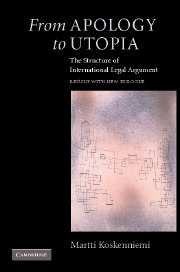Book contents
- Frontmatter
- Contents
- Preface to the reissue
- Acknowledgements
- List of abbreviations
- Introduction
- 1 Objectivity in international law: conventional dilemmas
- 2 Doctrinal history: the liberal doctrine of politics and its effect on international law
- 3 The structure of modern doctrines
- 4 Sovereignty
- 5 Sources
- 6 Custom
- 7 Variations of world order: the structure of international legal argument
- 8 Beyond objectivism
- Epilogue (2005)
- Bibliography and Table of cases
- Index
5 - Sources
Published online by Cambridge University Press: 16 July 2009
- Frontmatter
- Contents
- Preface to the reissue
- Acknowledgements
- List of abbreviations
- Introduction
- 1 Objectivity in international law: conventional dilemmas
- 2 Doctrinal history: the liberal doctrine of politics and its effect on international law
- 3 The structure of modern doctrines
- 4 Sovereignty
- 5 Sources
- 6 Custom
- 7 Variations of world order: the structure of international legal argument
- 8 Beyond objectivism
- Epilogue (2005)
- Bibliography and Table of cases
- Index
Summary
We have seen that it is, in principle, perfectly possible to conceptualize the totality of international legal norms as a consequence of the doctrine of sovereignty. In a sense, all legal norms are merely descriptions of what it is for each State to be sovereign. This is the way many classical lawyers presented their international law. Statehood was assumed given and the law followed in terms of the “absolute” and “conditional” rights which accompanied it. This approach seemed unworkable because of the abstract and ultimately subjective way that such rights were conceived. Moreover, it failed to explain the phenomenon that sovereignty was associable with the most varied kinds or rights and obligations. When modern lawyers were compelled to admit that sovereignty had no natural content, they also had to recognize that it did not serve as a reliable starting-point for deductions about the law.
The modern doctrine of sources of international law attempts to deal with the problem of the indeterminate character of the doctrine of sovereignty. On the one hand, it tries to provide for the concreteness of the law by refusing to accept any norms as simply given, either by virtue of statehood or some anterior normative code. It tells the lawyer where he can find the law in an objective fashion. On the other hand, sources doctrine also attempts to provide for the law's normativity by detaching it from the momentary views and interpretations which States might hold of its content.
- Type
- Chapter
- Information
- From Apology to UtopiaThe Structure of International Legal Argument, pp. 303 - 387Publisher: Cambridge University PressPrint publication year: 2006



